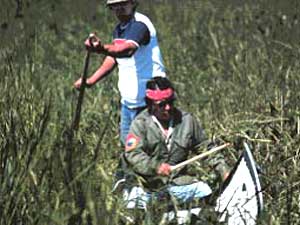|
Audio
Photos
More from MPR
|
March 8, 2005
The lakes and rivers on the White Earth Indian Reservation in northwest Minnesota are an ideal habitat for wild rice. But the tribe is worried that resource could be threatened by the science of genetic engineering. White Earth has become the first reservation in the country to ban the introduction or growth of genetically-modified wild rice seeds. Some White Earth Band members want to take it one step further. They want the Legislature to ban genetically modified wild rice statewide.
Bemidji, Minn. — For the Ojibwe people, wild rice is more than just a plant. Ancient prophecies lured the Ojibwe from their east coast origins to the Midwest, to a place where wild rice was plentiful. Mike Swan is White Earth's director of natural resources. Swan says wild rice is considered a sacred gift from the Creator.
"We give offerings for it," said Swan. "We give thanks when we go out and get some food for our families. We give thanks to... the Great Spirit, for allowing us this. And in our own history, Ojibwe history, we came to this area because of this plant, food that grows on water, which is wild rice."
Tribal members are worried the wild rice that has sustained them for centuries could fall victim to genetic pollution. Winona LaDuke is founding director of the White Earth Land Recovery Project. Her organization markets White Earth's wild rice internationally.
LaDuke is promoting a statewide ban on genetically modified wild rice. She's teamed up with Slow Food International, an organization that promotes the biodiversity and cultural identity of foods worldwide. LaDuke fears that as scientists tinker with the natural make-up of wild rice, it's only a matter of time before those modified seeds cross-pollinate with natural wild rice.
We believe it should be protected," said LaDuke. "We believe it shouldn't be genetically modified. And we're going to make a stand. And we believe the state of Minnesota should protect it as well, because it's a valuable and critical part of our state history and culture."
Not everyone agrees genetic contamination is a big concern. Scientists from the University of Minnesota have been studying wild rice for nearly two decades. A few years ago, researchers announced they had mapped a portion of the wild rice genome. That's the first step in tweaking the genetic structure of wild rice.
But researchers say they have no intention of doing so. Raymie Porter is a wild rice researcher for the University. He wasn't involved in the genome research. Porter says he's not aware of anyone anywhere in the world who is trying to genetically modify wild rice.
"Knowledge about the genetics of an organism is not necessarily something to be fearful of," said Porter.
Porter isn't a genetic researcher. He's considered a wild rice breeder. He cross-pollinates plants to come up with hardier rice that's less prone to damage by wind, insects and disease. Porter says the seeds are sold to commercial growers who cultivate wild rice on patty farms.
"I mean it's not like we're adding any new genes to any of the varieties that we've developed," Porter said. "It's simply a matter of selecting for certain traits that were already there in some frequency or other."
Some Native Americans oppose Porter's work. They say wild rice is a gift that shouldn't be altered by man. Porter says his domesticated wild rice isn't a threat to the natural version. He brushes off the criticism.
"If there's a scientific basis for it, we'll look at that," he said. "If it's a cultural or religious concern, then that's something that's not in the scope of my work to really address. I'm a plant breeder. We try to do what we believe is the right thing to do and the best thing to do for the people of Minnesota."
Porter's cultivated seeds would be allowed on the White Earth Reservation. The tribe's ban only includes genetically modified seeds. Those modified seeds are also the target of legislation supported by Winona LaDuke.
So far, that proposal doesn't have a sponsor in the House or Senate. LaDuke and representatives of Slow Food International are hosting a dinner in St. Paul to kick off their campaign. Then they'll begin lobbying lawmakers at the Capitol.






